Early results of the groundbreaking Baby’s First Years study have been published in the Proceedings of the National Academy of Sciences. The study is the nation’s first randomized control trial aiming to measure the causal impacts of poverty reduction strategies on children in early life, with this first study focused on infant brain activity. One thousand urban women were recruited from postpartum hospital wards to participate in the study, receiving either an unconditional gift of $333 or $20 per month for the first 52 months of their child’s life. To identify differences between the two groups, researchers measured children’s resting brain activity at age one, identifying significantly greater activity in areas of the brain associated with language, cognitive, and social-emotional scores later in life among the “high cash” group. The authors emphasize that findings can only speak to the first 12 months of a multi-year project, but that the research period aligns with a critical time of child development. The paper concludes by underscoring the need to focus on the child-development effects of income transfer policy, rather than the usual focus on maternal labor supply.

